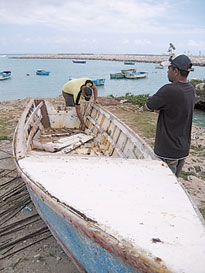
In Mexico, fishermen constructed lobster casitas, cement houses along the reef. By providing an ideal habitat, the casitas increased the number of lobsters. That meant that the Mexican fishermen could leave reef fish alone, and the ecosystem recovered. The Mexican fishermen also developed what has become a thriving fly-fishing industry geared toward tourists. (The fish are thrown back.) Paulino was impressed. The waters off Punta Allen were teeming with fish and lobsters, and the Mexican fishermen earned more money than before. APEJU would like to apply similar solutions here. "We're slowly opening our eyes," he says.
Colleen Gatliff, a Peace Corps volunteer stationed in Verón, Mexico helped organize a trip to show Dominican fishermen how their Mexican counterparts had successfully resolved a similar problem of reef degradation
Tourism tangles a fishing lifeline
Loss of sea access hits the Dominican Republic's already pressed fishermen.
By Moises Velasquez-Manoff | Staff writer of The Christian Science Monitor/
July 2, 2009 edition
Caption: Tourist developments that could block access to the ocean are a concern to fisherman such as Luis Paulino. Photos by Moises Velasquez-Manoff
Punta Cana, Dominican Republic
At the far eastern end of Hispaniola – an area famed for resorts and world-class golf courses that attract a globe-trotting international elite – a dirt road leads to a craggy, limestone shore. There, a few dinged and scratched yolas – brightly painted fishing boats – lie overturned on the rock or moored in the ocean. Humming, churning, and banging noises of a construction site fill the air, drowning out the sound of waves hitting the breakwater.
The scene encapsulates the hopes and fears of local fishermen. Their hope is to make a decent living for themselves and their families. Their fears center on how that can be done sustainably given the pressures of expanding tourist development, the reality of chronic overfishing, and degraded reef ecosystems, which have lessened the number of fish.
Fishermen here also fret over another threat: losing access to the sea. This road is the only access to the ocean for miles. To the north lie established vacation spots; to the south, Cap Cana, a resort that's partly finished.
The fishermen are concerned that as the construction of Cap Cana is completed, the road will close to them. Representatives of Cap Cana say this won't happen, but loss of access to the ocean is indeed a growing problem in the Dominican Republic, say experts. By law, beaches are public, but in reality, most beaches – 70 percent, according to one study – are now off limits to ordinary Dominicans.
"Privatized beaches are a grave problem in my country," says Felicita Heredia, a member of the commission on the environment at the Autonomous University of Santo Domingo (UASD) and author of the beach access study. She contrasts the situation with what she observed during a visit to Miami and Fort Lauderdale, Fla. At the end of each street, people could access the beach.
"We don't have that here," she says. "It's a problem of political vision."
In an e-mail, Ricardo Colón Alvarez, executive director of the newly formed Dominican office of fishery management, says, "Touristic development tremendously affects fishery development."
The fishermen put it more colloquially: "The bigger fish eats the little fish," says Luis Paulino. "In the Dominican Republic … money is law."
Tourism has grown dramatically here in recent decades. In 2008, 4.4 million people visited the nation of 9.5 million, according to the Ministry of Tourism, nearly double the number a decade earlier. Valued at $8 billion, tourism and related activities make up 15.9 percent of the economy. That influx of foreign money has spurred more development geared toward capturing more tourist dollars.
But communities are pushing back, says Luis Carvajal, a biologist at UASD. In March, fishermen in Cabrera on the island's north coast protested what they said were illegal developments blocking access to the sea. They called for an impact statement before construction proceeded.
The Ministry of Environment is also more assertive. In January, it demolished what it called illegally constructed buildings in Bayahibe.
The fishermen here have formed the Asociación de Pescadores de Juanillo, or APEJU. Their goal is twofold: fight to retain access to the ocean and learn to fish sustainably.
"We are not against touristic development," says Mr. Paulino. "It benefits us and it benefits the country. What we want is for them to give us a little piece, so we can survive."
Claudia Sánchez, spokesperson for Cap Cana, says the lone road will remain open to fishermen.
"Access won't be closed to them as it's how they earn their livelihood," she says in an e-mail.
But APEJU's members remain skeptical. And they have their reasons. Many of them once lived in a seaside village, now razed, on the site now occupied by Cap Cana's hotel and marina. Although they're quick to tell of forced evictions, they concede that many residents willingly sold out and moved to a village constructed for them some miles inland. But nobody expected to lose access entirely to that stretch of beach. They did, and this time they want a written guarantee that it won't happen again.
The path to sustainability, although fraught with challenges, is clearer. APEJU must try to manage how and when its 140 members fish, a new concept for them. The first step, already implemented, was not harvesting lobsters during egg-laying season. Next, they hope to institute a minimum tail size.
APEJU's members fish for sustenance and for sale locally. CODOPESCA, the government's year-old fishery management office estimates that there are some 13,000 small-scale fishermen operating in the island's seas, rivers, and lakes. Despite their small boats and generally low-tech equipment, they can have a significant impact – decades of unregulated fishing has significantly degraded the nation's reefs. The World Resources Institute says that overfishing poses the single greatest threat to Dominican reefs.
Poverty contributes to the problem. Fishing has historically offered people from humble backgrounds a way to earn a respectable living. But when others in a community see a fisherman's success, they join in. Soon, more are fishing than the ecosystem can sustain.
"The fishing effort is massive for the few fish there are," says Paulino. "We are doing harm."
But there are few if any jobs that would pay the often-illiterate fishermen even one-third of what they're currently earning.
Some alternatives have been suggested: The PUNTACANA Ecological Foundation, part of the PUNTACANA Group, offers courses in reef monitoring and fly-fishing. In the future, says Joe Power, a marine biologist with the foundation, they hope to put some areas off limits to fishing, an idea that usually meets stiff resistance from fishermen, but which can, in fact, improve nearby catches.
Last year, Paulino and three other members of APEJU visited Punta Allen in Yucatán, Mexico. Colleen Gatliff, a Peace Corps volunteer stationed in Verón, helped organize the trip. Her idea: Show Dominican fishermen how their Mexican counterparts had successfully resolved a similar problem of reef degradation.
In Mexico, fishermen constructed lobster casitas, cement houses along the reef. By providing an ideal habitat, the casitas increased the number of lobsters. That meant that the Mexican fishermen could leave reef fish alone, and the ecosystem recovered.
The Mexican fishermen also developed what has become a thriving fly-fishing industry geared toward tourists. (The fish are thrown back.)
Paulino was impressed. The waters off Punta Allen were teeming with fish and lobsters, and the Mexican fishermen earned more money than before.
APEJU would like to apply similar solutions here. "We're slowly opening our eyes," he says.













